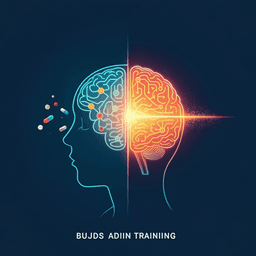
Psychology
A randomized controlled trial on the digital socio-emotional competence training Zirkus Empathico for preschoolers
S. Naumann, M. Bayer, et al.
This groundbreaking study by Sandra Naumann and colleagues reveals that the digital training program *Zirkus Empathico* significantly boosts socio-emotional skills in preschoolers. Participants showed remarkable growth in empathy and behavior, highlighted by EEG data indicating heightened emotion sensitivity. Discover how *Zirkus Empathico* is revolutionizing early childhood emotional development!
~3 min • Beginner • English
Introduction
Socio-emotional competence (SEC) in preschool years encompasses skills such as empathy, emotion recognition, and prosocial behavior that support children’s adaptation to social contexts and long-term mental health and academic outcomes. Empathy includes cognitive and affective components and is linked with emotion recognition and prosocial behavior. Preschool is also a sensitive period for the onset of mental health problems, and SEC is a resilience factor. Classroom-based SEC programs show small to moderate benefits but can be difficult to individualize and to implement sustainably at scale; the COVID-19 pandemic further highlighted the need for home-based digital options. Digital tools can offer naturalistic, engaging learning experiences but evidence for digital SEC training in typically developing preschoolers is limited, with most prior work targeting neurodevelopmental conditions (e.g., autism) and indicating benefits of the Zirkus Empathico app in that population. The present study aimed to test the effectiveness of a 6-week home-based digital SEC training (Zirkus Empathico) in typically developing preschoolers (ages 4–6). The pre-registered primary hypothesis was that training would improve empathy compared to an active control (digital foreign language learning). Secondary hypotheses anticipated gains in emotion recognition and prosocial behavior and reductions in behavioral problems. Given calls to include neurobiological measures in intervention evaluation, the study also examined event-related potentials (ERPs: P1, N170, P3) during facial emotion processing, with the expectation of larger post-training P1/N170 and P3 amplitudes in the training group, and exploratory analyses of 3-month follow-up and brain–behavior associations.
Literature Review
The introduction synthesizes evidence that empathy (cognitive and affective) and emotion recognition are core components of SEC and relate to prosocial behavior and later outcomes. Preschoolers recognize positive emotions more accurately than negative ones; emotion recognition correlates with empathic concern and shares neural substrates with processing of one’s own emotions. Meta-analyses indicate classroom-based SEC programs yield small to moderate gains in SEC facets. German classroom programs improved emotion recognition, empathy, and prosocial behavior, yet scalability and individualization are challenging. Digital interventions for children have proliferated but few target SEC in typically developing preschoolers; most focus on autism, where Zirkus Empathico previously showed moderate gains in empathy and emotion recognition post-training, with more stable effects on awareness of own emotions, regulation, and prosocial behavior. ERP literature in preschoolers shows facial expressions modulate early (P1, N170) and later (P3) components, though associations with SEC are mixed. This background motivated testing Zirkus Empathico at home in typically developing preschoolers and evaluating both behavioral and neural outcomes.
Methodology
Design: Pre-registered randomized controlled trial with longitudinal assessments at baseline (T1), immediately post 6-week training (T2), and exploratory 3-month follow-up (T3). Participants: 74 typically developing Central European preschoolers (mean age 5.1 years, SD ~0.9; 34 females) randomized to Zirkus Empathico (N=36) or active control (N=38). Inclusion/exclusion: Excluded nonverbal IQ<70 (CPM), verbal age <4 years (PPVT), autism symptomatology (SRS >76), neurological/psychological disorders, training/EEG-impairing medication, or concurrent socio-emotional trainings/trials. SES measured by Winkler index; sample ranged medium to high. Recruitment October 2018–July 2020; paused March–May 2020 due to COVID-19. Randomization: Covariate-adaptive minimization (age < or ≥5.3 years; gender), using QMinim biased coin (base probability 0.8). Blinding: Families not blinded to app content but study advertising framed both as educational (language vs. SEC); T2 assessors were blind to group. Interventions: Zirkus Empathico is a tablet-based training targeting awareness and differentiation of own/others’ emotions, facial emotion recognition, context-based emotion inference, empathy and prosocial responses via naturalistic videos and an interactive emotion manikin (valence/arousal). Control was Squirrel & Bär, a tablet-based early English vocabulary app with comparable length, intensity, and parental involvement. Training regimen: 6 weeks home-based; minimum 60 min/week; daily cap 30 min enforced via Screen Time app; tablets provided. Parents instructed to minimally assist (only for understanding tasks or technical issues). Measures: Primary outcome empathy via parent-report Griffith Empathy Measure (GEM) and EMK 3–6 parent empathy subscale; child assessment EMK 3–6 empathy (perspective-taking, emotion sharing). Secondary outcomes: Emotion recognition via EMK 3–6 child assessment and parent rating; Prosocial behavior via EMK 3–6 child assessment and SDQ parent prosocial subscale; behavioral problems via SDQ total problem behavior subscale (reported as reduction). Neural outcome: Post-training EEG/ERP facial emotion task (happy, angry, neutral adult faces from standardized databases), with oddball ape-face target detection to maintain attention (accuracy ~72%). Stimulus timing: fixation 500 ms, ISI 400–600 ms, face 1000 ms, ITI 1000 ms; 180 trials (3×60), with constraints on repetition. EEG acquisition: 46-channel 10–20 montage (Refa amplifier), 500 Hz sampling, online reference Cz, impedances <10 kΩ, EOG recorded. Preprocessing: 0.01–30 Hz bandpass, 50 Hz notch, re-referenced to average, ICA for ocular artifact removal, epoch −200 to 1000 ms, baseline −200 to 0 ms, artifact rejection ±200 μV plus visual inspection. ROI electrodes: P1/P3 at PO3/4/7/8/9/10, O1, O2, Oz; N170 at P7, TP7, CP5 and P8, TP8, CP6. ERP quantification: P1 peak 90–130 ms (mean amplitude ±20 ms), N170 peak 180–220 ms (±20 ms), P3 mean 300–500 ms. Sample size: Based on meta-analytic effect size d=0.47 for tech-based autism interventions, 80% power, alpha 0.05, assumed 20% attrition, target N=74 ITT. Data analysis: For behavioral outcomes, change scores (T2−T1; for SDQ problem behavior, T1−T2 as inverted) analyzed via ANCOVAs with group as between factor, baseline as covariate; both ITT (MICE multiple imputation, m=50) and per-protocol (PP) reported; effect sizes as Cohen’s d. ERP analyses: Two-way mixed ANOVAs with group (between) and facial expression (within: happy, angry, neutral). Complementary: Training fidelity via Welch’s t-tests; exploratory follow-up T3 complete-case ANCOVAs with within-subjects time (T1–T2 vs T1–T3); exploratory Pearson correlations between SEC measures showing training effects and P3 difference waves (happy−neutral; happy−angry).
Key Findings
- Primary outcome (Empathy): No group difference for GEM parent ratings (ITT d=0.23, 95% CI −0.23 to 0.70, p=0.32; PP d=0.20, p=0.35). EMK 3–6 empathy parent ratings showed larger gains for Zirkus Empathico vs controls (ITT d=0.28, −0.17 to 0.76, p=0.045; PP d=0.32, p=0.02). EMK child empathy assessment showed a nonsignificant trend (ITT d=0.29, p=0.07; PP d=0.28, p=0.09).
- Secondary outcomes:
• Emotion recognition: EMK child assessment favored Zirkus Empathico (ITT d=0.57, 0.01 to 1.06, p=0.006; PP d=0.54, p=0.01). Parent ratings not significant (ITT d=0.04, −0.42 to 0.50, p=0.15; PP d=0.05, p=0.05).
• Prosocial behavior: EMK child assessment no group difference (ITT d=0.02, p=0.57; PP d=0.04, p=0.54). SDQ parent prosocial increased more in Zirkus Empathico (ITT d=0.51, 0.05 to 0.99, p=0.008; PP d=0.46, p=0.004). SDQ parent problem behavior declined more in Zirkus Empathico (ITT d=0.54, 0.08 to 1.03, p=0.01; PP d=0.62, p=0.01).
- ERP outcomes (post-training only):
• P1: No training effect (d=0.19, p=0.43). Main effect of expression (d=0.16, p<0.008): happy > neutral; angry ≈ neutral; happy ≈ angry.
• N170: No effects of training, expression, or interaction (all d≈0.07–0.08; p>0.63).
• P3: Main effect of expression (d=0.12, p=0.03); interaction with training (d=0.11, p=0.04). Zirkus Empathico showed larger P3 amplitudes for happy vs neutral (p=0.01) and happy vs angry (p=0.02); controls showed no significant P3 modulation.
- Training fidelity: Comparable engagement and parental involvement between groups (training time minutes: Controls M=323.76 (127.95) vs Zirkus Empathico M=351.21 (122.52), p=0.36; parental engagement ratings p=0.40). Parents reported good compatibility with daily routines.
- Exploratory follow-up (T3, 55.4% response): GEM parent empathy showed larger gains from T1 to T3 for Zirkus Empathico (d=0.77, 0.21 to 1.31, p=0.002); other outcomes showed no significant long-term changes.
- Brain–behavior correlations: No significant correlations between P3 difference waves (happy−neutral; happy−angry) and SEC measures that showed training effects (all p>0.11).
Discussion
Findings partly supported the primary hypothesis: parent-rated empathy improved on the EMK 3–6 scale (which includes items reflecting empathic prosocial actions), but not on the GEM, suggesting that Zirkus Empathico may preferentially enhance empathy as enacted in everyday prosocial behaviors. Secondary outcomes showed that the training improved emotion recognition in child assessments, increased parent-reported prosocial behavior, and reduced parent-reported problem behaviors, aligning with prior evidence from classroom-based SEC programs and indicating home-based digital SEC training can be effective and feasible. ERP results suggest training-related modulation at later stages of emotion processing: larger P3 amplitudes for happy (vs neutral/angry) faces in the training group point to increased processing resources toward positive emotional stimuli, potentially reflecting adaptive attention or emotion regulation processes. This neural pattern dovetails with observed behavioral gains and previous reports of improved emotion regulation with Zirkus Empathico in other samples. Exploratory follow-up indicated a possible sleeper effect for empathy on the GEM at 3 months, though other SEC gains were not maintained. Overall, the results indicate that a 6-week, minimally guided, home-based digital SEC training can produce measurable benefits in preschoolers’ socio-emotional functioning and alter neural sensitivity to positive facial expressions.
Conclusion
This RCT demonstrates that Zirkus Empathico, a home-based digital SEC training, can improve select facets of socio-emotional functioning in preschoolers—enhancing parent-rated empathy (EMK), child-assessed emotion recognition, parent-reported prosocial behavior, and reducing problem behaviors—while modulating neural processing (greater P3 to happy faces). These findings support the feasibility and potential of scalable, low-cost digital SEC tools as preventive educational resources. Future research should: (1) test longer training durations and booster sessions to promote durable transfer; (2) systematically vary and measure parental involvement to enhance generalization to daily life; (3) include pre–post EEG and paradigms targeting emotion regulation mechanisms; (4) recruit larger and more socioeconomically diverse samples for adequate power and generalizability; and (5) refine and diversify empathy measures suitable for young children.
Limitations
- Outcome dependence on parent ratings for several measures increases risk of rater bias; although parents were not informed about the app’s true focus, full blinding was not possible.
- GEM showed only sufficient-to-low internal consistency at baseline (α=0.64), limiting sensitivity; alternative empathy measures (e.g., EmQue) may be preferable.
- EEG collected only post-training, precluding within-subject neural change assessment; implicit EEG task limits insight into explicit recognition performance during EEG.
- ERP effects were small; the sample size may have been underpowered to detect subtle neural effects or brain–behavior associations.
- Follow-up analyses were exploratory with 44.6% attrition; complete-case analysis may bias estimates and limits generalizability.
- Sample skewed toward middle to upper SES families, restricting generalizability.
- Minimal parental guidance may have constrained transfer of some skills; training intensity (6 weeks) may have been insufficient for sustained effects.
- Increased screen time is an inherent consideration; necessitates monitoring and guidance to avoid excessive use.
Related Publications
Explore these studies to deepen your understanding of the subject.







